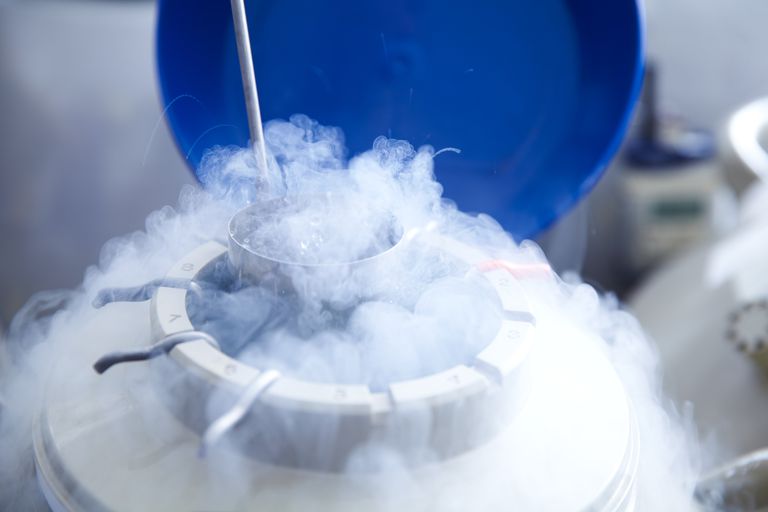To get into a chance to have a baby, despite the decline in fertility that accompanies the advancing age, more and more women trying to have their eggs frozen. A technique that is not a guarantee, however, remains a debatable topic.
Initially, egg freezing was developed for women with cancer whose fertility could be compromised by chemotherapy. But in recent years, it has become an option for women who want to have children. But for whom it is not the right time, either because they have not found the right partner, or because they do not feel ready.
“The women who opt for this solution are more numerous. Indeed, it is considered that the ideal age for the freezing of its oocytes is around 33-35 years. That’s when their quality is still good. By having their oocytes harvested and frozen, women have the opportunity to be able to donate oocytes to themselves later on.
GOOD TIMING
“Up to 36 years, the chances of pregnancy with a frozen oocyte are 5 to 7%,” says Dr Catherine Houba. This is why doctors recommend taking 20 oocytes, which are usually obtained in two cycles of hormonal stimulation. In this way, a woman who has her eggs frozen before 36 is very likely to have a baby later. Between 36 and 40, the situation becomes more complicated because the woman produces fewer and fewer oocytes at each cycle and the chances of pregnancy with an older oocyte decrease.
At age 40, the chances of pregnancy with a frozen oocyte drop to 1%. It would take much more oocytes to ensure fertility while we produce less. Most centres, therefore, refuse to freeze the oocytes of women over 40 because it would be costly and would make them take risks – restricted, but still – for a few results. If you’re 38 years old and you did not have children, you may have to ask yourself, would not I be a baby all by myself now? In the sense that, at this age, freezing her eggs will not solve the problem since it will not increase much the chances that these women would have to get pregnant two years later.
A DECISION NOT INNOCUOUS
To freeze your oocytes, the first step is to make an appointment at a medically assisted procreation centre (PMA). An information consultation and a meeting with a psychologist are usually organized. “It’s never trivial to take your phone to freeze your eggs. It is often that something happened: a rupture, the discovery of a deficiency in a girlfriend. And the women are often disappointed when they discover that the freezing is not insurance to have a pregnancy later. “
If we are still convinced, a medical check-up is done. As for in vitro fertilization (IVF), oocyte retrieval involves ovarian stimulation. This treatment makes it possible to produce more oocytes per cycle. Once the oocytes have been removed, the laboratory freezes them, by vitrification technique, a type of ultra-rapid freezing which makes it possible not to modify the structure of the oocytes, so that they remain intact during thawing. With hormonal stimulation, a woman under 36 produces about ten oocytes per cycle (instead of just one naturally). Thus it is necessary to carry out a second cycle to harvest about twenty.
FIRST OF ALL, NATURALLY
The centre of PMA is responsible for the conservation of oocytes. The day the woman decides to start a pregnancy project, it is recommended – if she is a couple – not to use these frozen oocytes as a first resort but to try to get pregnant naturally for at least six months.
In case of failure, a fertility report is made. If the cause proves to be insufficient production of functional quality oocytes, the oocytes are then thawed, and IVF is performed with the spouse’s sperm. The embryo produced in vitro is re-implanted in the uterus. “The law states that you can create embryos by IVF until the eve of 46 years and can be transferred until the eve of 48 years,” says the specialist. Most women, however, decide before.
NOT GIVEN TO EVERYONE
For three years, the procedure for freezing oocytes in case of cancer has been fully reimbursed, for patients under 36 years old. In other cases, the process remains expensive. It costs about 1500 Euros for a cycle of hormonal treatment (laboratory fees, ultrasound, blood tests, and sampling procedures). Two cycles are necessary to ensure the chances of later pregnancy, bringing the cost to 3000 or 4000 euros. Delaying her pregnancies, in other words, is not yet given to everyone.
However, one needs to do a lot of research and finalize the most reputed clinic to preserve one’s eggs. Several factors one must consider before arriving at any decision. Not every clinic has the right infrastructure and facility to safeguard your eggs.
You need to gather complete information from reliable sources before taking the final decision. A centre having that does egg freezing, egg thawing should also have a success rate. The eggs are highly fragile and sensitive. They must be freeze using an optimal freezing technique to preserve them. It is must have a comprehensive knowledge of the centre and its freezing methods, thawing technique, etc.
Freezing eggs in the early ’30s is a good idea. Like that time, your body is ready for it. It can offer you great peace of mind too. If you are a single woman, you can freeze your egg in your 30’s. You will have no problem in getting pregnant when you want in a conventional way. But if you freeze your eggs in your 40’s the chances of a healthy and successful pregnancy are meagre. One should consult a doctor and know about the entire procedure of cryopreservation before making a confirmed decision. The most significant benefit of preserving the eggs is fair chances of having a baby.

